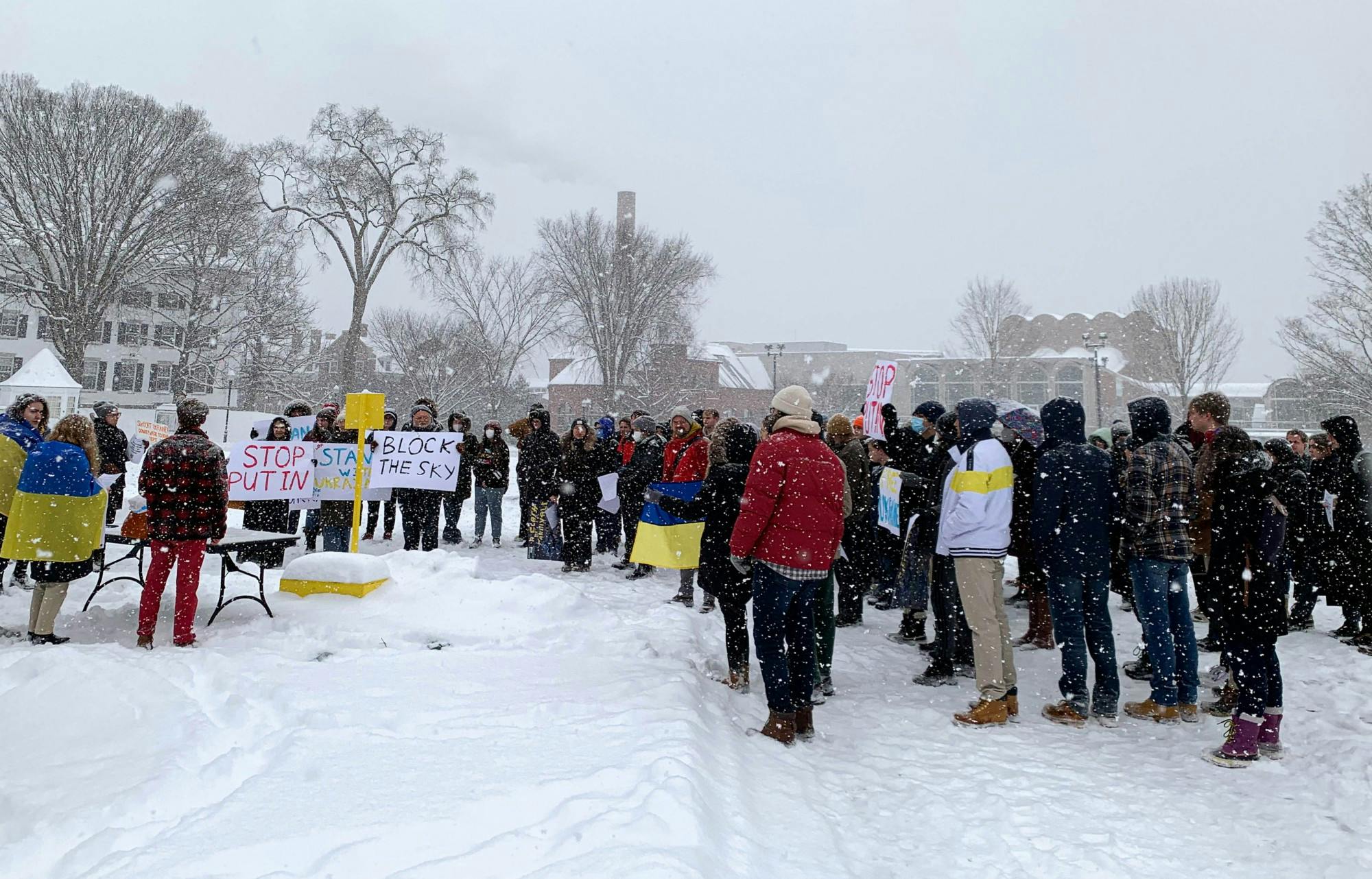When Russia began its full-scale invasion of Ukraine on Feb. 24, the entire world stopped to watch. Since then, despite constant media coverage of the war, many non-Ukrainians have let the invasion slip into the background of their lives. But for members of the Dartmouth Student Alliance for Ukraine, who are doing everything they can to raise awareness and help the war effort, not paying attention is not an option.
As president and vice president of Dartmouth’s Ukrainian Student Association, Zhenia Dubrova ’24 and Polly Chesnokova ’24 have been thinking a lot about the effects of the war in Ukraine on Dartmouth students.
“We’re just kind of trying to raise our hand and be like, ‘Hey, our people are dying,’” Chesnokova said. “We are the ones shedding blood [and] protecting democracy.”
To that end, Dubrova and Chesnokova are currently running an auction to raise funds for soldiers who are known personally by the Ukrainian students at Dartmouth. The auction encourages members of the Dartmouth community to offer their time or expertise for other students to bid on; it began October 29th and will continue through this Sunday, November 13th. Some of the experiences on offer include a mushroom-foraging expedition, playing fetch with a dog, conversing with Dartmouth faculty members and Ukrainian cooking lessons.
For Dubrova, the auction represents a lighthearted way to make a difference.
“People are not as engaged with the topic as they should be; that’s why we wanted to do this auction,” Dubrova said.“We tried raising money before in the spring — and it’s always very difficult to engage, unfortunately, as people are just tired of hearing constantly about the war.”
While some students may no longer keep up with news related to the war, it is difficult for Ukrainian students to distance themselves from a situation that directly involves their family and friends. Chesnokova’s parents live in Kyiv, so they are constantly thinking about the effects of the war on their family.
“Today there were some bombings in Kyiv, and so I woke up and I was texting my parents,” Chesnokova said. “That’s the first thing that I do — just check if they’re alive. For us, [the war] never ceased to be very personal.”
When they arrived on campus as a freshman during the pandemic, Chesnokova was — to their knowledge — the only Ukrainian student on campus. Since the beginning of the invasion, Dartmouth’s Ukrainian community has come together to create a strong network of support, which Chesnokova noted with pride.
“I like being in the room with ten other Ukrainians from different years,” they said. “I’m very proud to say that we have postdocs and graduate students that have joined and really work with us on organizing these events.”
Outside of these rooms, Dubrova said, the broader Dartmouth community can tend to focus on Russia’s role in the war, at the expense of highlighting the conditions in Ukraine.
“A lot of the students would ask me questions about Russia and not Ukraine — questions about Putin and the future of democracy in Russia” she said. “And I’m like, why are you asking me all these questions?”
Kyrylo Fomin ’26 voiced frustration with college events on the war which featured only Russians, including two events in October with Gary Kasparov — Russian chess championship and human rights activist — and the upcoming event on November 10 with Mikhail Gorbachev’s chief English interpreter, Pavel Palazhchenko. While these events aren’t all being hosted with the express purpose of discussing the war, Fomin noted the relative absence of Ukrainian activists or experts.
“Why invite a speaker from Russia to talk about the situation when you can invite a Ukrainian one?” he asked. “The school doesn’t do enough for the students to understand the Ukrainian perspective.”
Fomin added that people miss the fact that Russia is a colonial state and the war has significant colonial context
“Just because [Russia] did not colonize the south or western hemisphere doesn’t mean they are not colonizers,” he said.
Dubrova emphasized the importance of understanding this conflict, not just in terms of political theory, but in terms of human life.
“I wish that students in particular would talk more and ask questions more,” she said. “And think about the war, not just in geopolitical terms and not just in terms of the west and Russia, not even just in terms of Putin and Zelensky, but in terms of actual human experiences — what it's like to live through the war and to have families that are living through the war.”
Though they still hope for greater awareness on campus, the Ukrainian Student Association has accomplished a lot in the months since the invasion began. In addition to the ongoing auction, they’ve used social media to promote on-campus events like a vigil for Ukraine in April, screenings of documentaries about life in Ukraine’s warzone, a multi-media exhibition in May and fundraising efforts for Ukrainian refugees.
Throughout these efforts, Chesnokova has been impressed with the Dartmouth community’s support.
“We’re just really happy to see interaction coming from non-Ukrainians,” they said. “To me, when I see people who are understanding the impact that [the war] has on a global level, I value that a lot.”
The efforts of the Ukrainian Student Association remind us that there’s still a long way to go — a point which Dubrova underscored.
“Even though the people [at Dartmouth and in the US] are experiencing war fatigue, the fight in Ukraine still continues,” she said. “It continues every day.”




